Down Under Climate Hopes Up
Air Date: Week of June 3, 2022
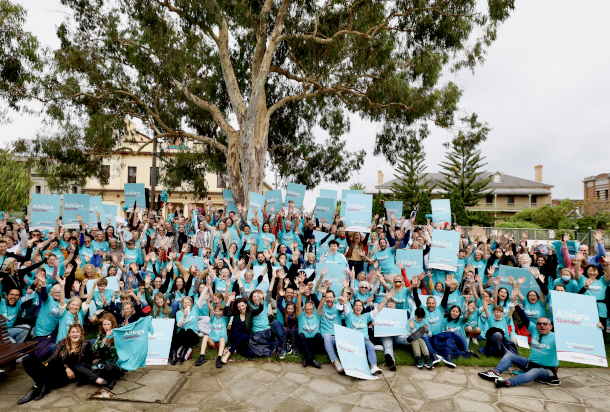
The campaign launch of “teal” independent candidate Allegra Spender, who defeated Liberal MP Dave Sharma in the 2022 elections to win a seat in the Australian Parliament. (Photo: Blair Palese, used with permission)
Australia is a leading coal and natural gas exporter and has stubbornly opposed major climate action for decades, even as climate disasters like fires, floods, and droughts have taken their toll. But now Australian voters have ushered in a more progressive Parliament in the recent elections that signals their country is heading in a new direction on climate. Blair Palese is managing editor of Climate and Capital Media and joins Host Steve Curwood to discuss.
Transcript
DOERING: From PRX and the Jennifer and Ted Stanley studios at the University of Massachusetts, Boston this is Living on Earth, I’m Jenni Doering
CURWOOD: And I’m Steve Curwood.
Australia is the world’s biggest exporter of natural gas and second biggest exporter of coal and for decades it has stubbornly opposed major climate action at home and abroad. Until now. A series of climate related fires, floods and droughts has battered Australia so much in recent years that a few weeks ago a majority of voters said enough and tossed out the climate-denying right wing Liberal-National party alliance. Bolstering the winning Labor party were Green Party voters and so-called teals. Teals are moderate candidates who blend Green party values of climate action and women’s rights with the fiscal conservatism of Australia’s blue Liberal-Nationals. Joining us from Sydney to discuss is Blair Palese managing editor of Climate & Capital Media and cofounder of 350.org Australia. Blair, welcome to Living on Earth!
PALESE: Thank you so much.
CURWOOD: So give me the skinny, what happened in this election? Why did voters seem to respond so much more enthusiastically to independents?
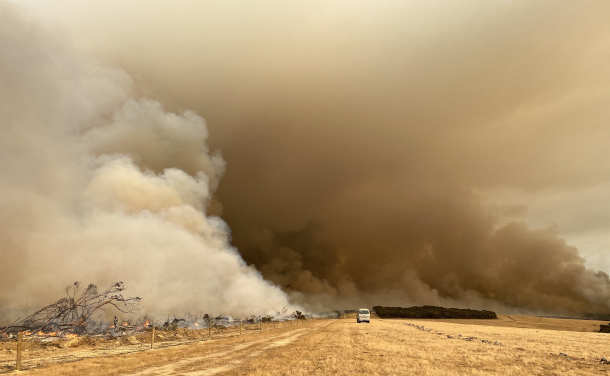
A January 2020 fire on Kangaroo Island, which lies off the southern coast of Australia. Nearly half of the island burned in the devastating 2019 - 2020 “Black Summer” fires. (Photo: robdownunder, Flickr CC BY-NC-ND 2.0)
PALESE: Yeah, it was quite a transformation of the country overnight, when we went from a very far right, conservative government that was made up of two parties really out of touch with Australia, and particularly ignoring the issue of climate change, as well as the incredible impacts of fires and floods that we've had over the last three and a half years. I think the public reaction was very much to that. But the community base of these independent candidates coming up very much out of their local electorates made a huge difference, because, you know, they were people that the community knew; they were putting forward very clear agenda about what they wanted to address, and climate change topped the list. And it was a real change for the kind of politics that have been going on here for the last decade.
CURWOOD: One of the interesting things about these "teal" independents that I've read, is that on a number of issues, they would be considered moderate, maybe even ever so slightly conservative, but really gung-ho on dealing with the environment and the rights of women and so forth. How accurate is that? And to what extent do you think a place like the United States could use independent activists along those lines?
PALESE: That's a great question. I actually think what Australia just did is a model for much of the world in that the kind of conservative parties -- in America, it would be the Republicans -- have gone to such a far right extreme, that it doesn't represent any more the kind of mainstream or middle sector of the country. That was very much the case here, that the party had taken their party way off into a far right agenda that most people could not accept, or have any kind of appreciation for. And the teal women and these independents saw the opportunity to run on what used to be kind of the old Liberal Party agenda -- that was our conservative party. And they would call themselves fiscally conservative, but socially progressive. So these women and others put forward a position that was back to that kind of old thinking of, we want a strong economy, but we want to address all the major issues. And in fact, you can't ignore the economic opportunities of climate change. And they saw that as a positive economically, as well, as you know, being supportive of women. One of the challenges of the previous far right government was women just were not being included in any way. And women's issues were not being addressed. We've had an incredible number of sexual assault cases and accusations of harassment in the government. So when these women candidates stepped up out of their community, most of them very successful professionals in their own right, and said enough is enough on the climate front, on the integrity front and on the women's front, I think there was a real resignation of that not just with women, but with men feeling like it was time for a change.
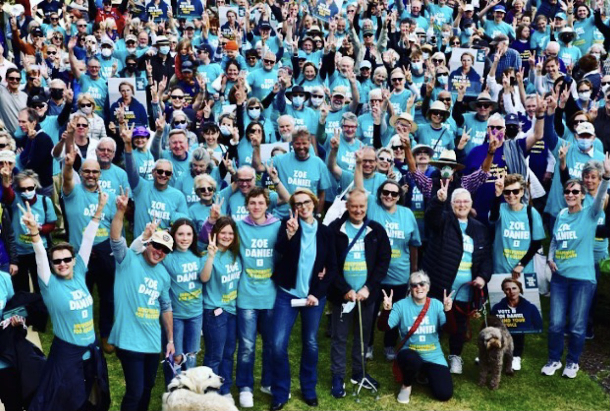
Supporters at winning “teal” candidate Zoe Daniel’s campaign launch. She unseated incumbent Liberal MP Tim Wilson in the 2022 elections. (Photo: Margo Kingston, No Fibs, used with permission)
CURWOOD: Now, Rupert Murdoch, the media mogul, by the way, has Fox in the United States, along with the Wall Street Journal and some very conservative publications in the UK. He, of course, came out of Australia, originally made his money there. To what extent did the Murdoch media empire play into the rhetoric of this campaign and the parties that lost?
PALESE: Yeah, Rupert Murdoch was 100% part of this campaign on the wrong side, on the losing side. And many commented after the election that Rupert Murdoch lost the election, as in, people refused to vote and support the Murdoch agenda, which is very much propaganda. It just isn't news as we know it. It's not independent in any way. It's not objective in any way, it comes with an agenda. Rupert Murdoch owns 85% of the media in Australia.
CURWOOD: Of the electronic media?
PALESE: Not just electronic: the Australian newspaper, The Daily Telegraph, newspapers as well, community papers; in Queensland they own 100% of the media. So the fact that voters really rejected that openly says a lot about how far it's gone, and how much people have really had enough of feeling like they're being used through this political agenda that Murdoch brings, and that the connection between the politicians and the media is a dangerous alliance that just doesn't allow for democracy.
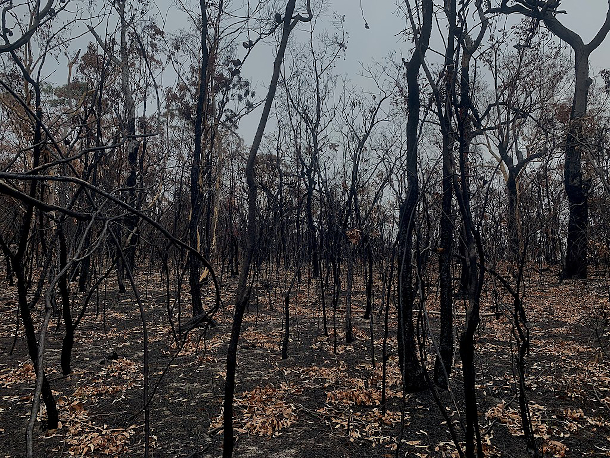
A blackened forest in Yengo National Park in New South Wales that burned during the 2019 – 2020 summer fires. (Photo: Olderthangoogle, Wikimedia Commons CC BY-SA 4.0)
CURWOOD: I remember seeing over these last year or two, some pretty horrific scenes involving drought and fire and problems. I mean, to what extent have the climate catastrophes in Australia contributed to these election results?
PALESE: Absolutely, 100%. I think, Queensland in particular, not just drought and fire but flood over the last year and a half. I mean, extreme flooding where people lost everything, images of people climbing up to their roofs to be removed by helicopter, people being swept away in their cars. There was a death toll, there was a massive impact on businesses, on communities, on houses. So you had a combination of that. And then the fires on the East Coast about two and a half years ago, two years ago, where the smoke was so heavy for so along with the actual impacts of smoke on people's health, and the death toll from that was extreme. And we didn't see any recognition of this as a problem or ownership by the government of attempting to solve the problem, whether it was through, you know, aid after the fact of these catastrophes or addressing climate change itself. So the frustration level was extremely high everywhere around the country.
CURWOOD: So tell me now, what has the new prime minister, Anthony Albanese of the Labor Party, what's he said about climate change during the campaign, and now that he's in office? How's he going to address it?
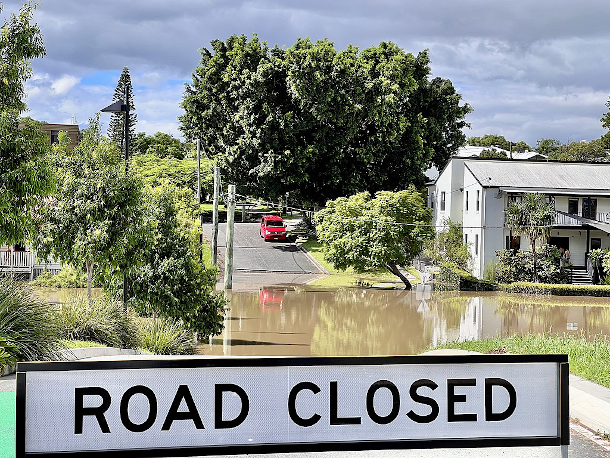
Flooding in Brisbane, the capital of Queensland, in February 2022 (Photo: Kgbo, Wikimedia Commons CC BY-SA 4.0)
PALESE: He does have a policy, his party has a policy. It's not nearly as far as it should go in terms of setting real targets for emissions reduction, really solid transition out of fossil fuel power here in Australia. And I think, you know, one of the biggest challenges for all of Australian politicians anywhere is that on the agenda, we don't have the issue of exports -- which, you mentioned liquid natural gas, and coal, we're one of the biggest exporters in the world. This isn't yet on the agenda, because under the Paris Agreement, we are not responsible for those emissions. And I feel that has to change in order for the country of origin to take responsibility. But that said, Albanese has a policy, he has some approach, ideas about how to progress things. He did, once elected, say we want to turn Australia into a renewable energy superpower. This is a vast improvement from where we've come.
CURWOOD: Well, what about coal, though? I mean, I think coal is almost totemic there in Australia, in terms of an industry, the miners, the Liberal party really supporting it. I mean, how far can Albanese go in terms of dealing with coal without running the risk of, of not being able to keep his job?
PALESE: It's a challenge, and it's certainly a challenge in those communities. But you did see a change in places like Queensland, where previously it had been very much you couldn't talk about that. And these Greens and Independents got elected -- Queensland, unbelievable, just has three Greens that have come up, it's now like the seat of Greens! So the switch over is incredible. I think the inevitability of understanding that the transition has to happen, and what we need is policy to allow it to happen and protect workers and communities. Albanese is probably the best placed to do that, because he's connected in good context with the labor union movement here, that does help. How do you broker a way forward that can help workers and communities while making that difficult transition economically? So he's probably best placed. And I'd add, with the pressure of the Greens and the independents to say, we must continue to keep climate front and center. So it's not just about how slow we go on that transition to soften the blow, but to do it effectively. And I think he can do it with that kind of pressure. And that's what we're all hoping, post the election.
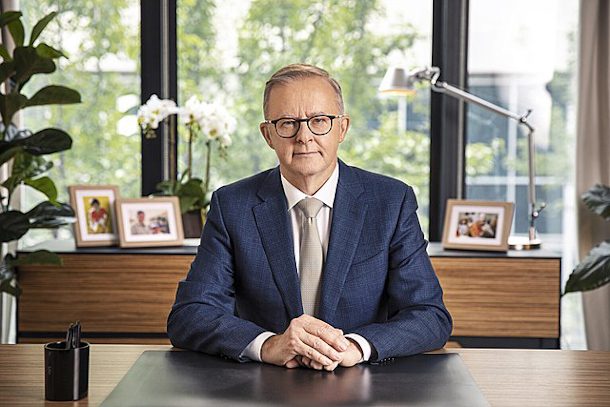
Newly elected Prime Minister Anthony Albanese has called for Australia to become a renewable energy superpower, though he also supports some continued extraction of coal. (Photo: Australian Government, Wikimedia Commons CC BY 4.0)
CURWOOD: So the fossil fuel industry, Blair, is one of the richest and most powerful entities on the planet. I'm thinking Russia, I'm thinking Saudi Arabia, I'm thinking the United States, and what's been going on in Australia for that matter. So even with the climate being so front and center in this newly elected Parliament, at the end of the day, how can your country extricate itself from that very intense and expensive, money related relationship within the coming decades?
PALESE: I'd give you an example of a mining magnate here called Andrew Forrest, his nickname is Twiggy. So everyone laughs about his nickname, "Twiggy Forrest." [LAUGHS] He, he is a mining, steel, iron ore magnate; had depended for decades and decades on fossil fuels as a big part of what he was doing in terms of energy. He now says we have to get off coal 100%, we have to do it very fast. And he's become the biggest advocate in the world for green hydrogen, as a alternative to fossil fuels and a way to continue to do all ranges of heavy industry, whether it's iron ore, or whether it's heavy industry and transport. He has a vision. It is transformational of a kind that few others are doing in the world today, but I expect that many will follow in his path. Whether that will be Saudi Arabia or Russia, I doubt, but in America, places like America, places like Australia, places like the UK and Europe, the writing is on the wall that there's money to be made in these sectors and in this transformation. And I think people are getting excited about that and seeing it not as a struggle, but as, the transition as an opportunity.
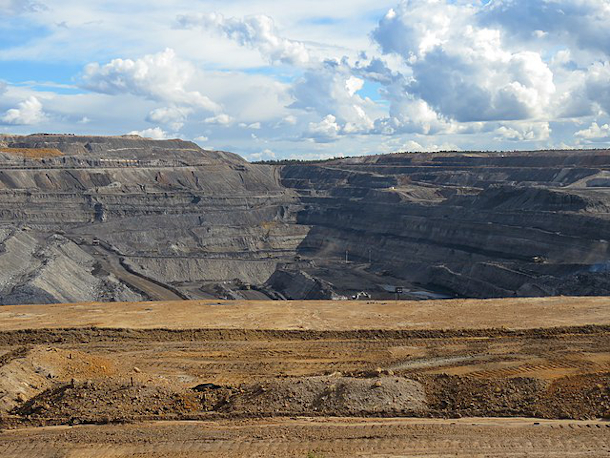
The Premier Coal mine in the Collie coal basin of Australia in April 2022. Australia is the world’s second largest exporter of coal. (Photo: Calistemon, Wikimedia Commons CC BY-SA 4.0)
CURWOOD: Looking at the world, there wasn't a whole lot of progress made at COP26 last year in Glasgow, Scotland, in terms of getting coal phased out. I mean, there was a tiny nod, but it was pretty watered down. Now there's another big climate summit coming in November. It'll be in Egypt. And actually, as we're speaking there's the interim session in Bonn, Germany that is looking at some of these things, to try to get prepared for the fall. Now previously, Australia has been very skeptical at these gatherings and has not wanted to pitch in. What role might Australia now play in helping to steer the global community in the right direction at the UN climate negotiations?
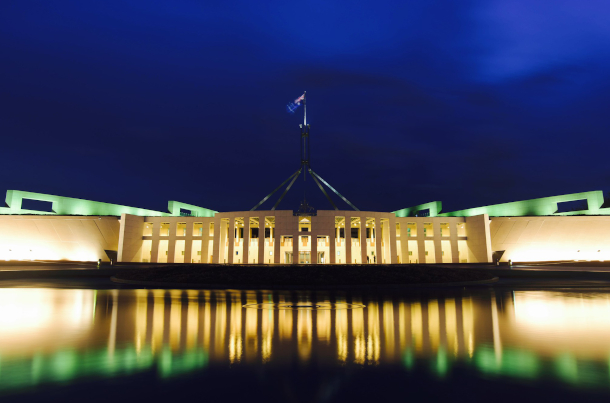
Australian Parliament House in the capital, Canberra (Photo: Jerry Skinner, Flickr CC BY-NC 2.0)
PALESE: It's a great question. I think Australia has the opportunity to come in with a bit of fresh blood and new ideas and excitement, to make a difference, to talk about this transformation, to bring some of these examples of these entrepreneurs who are really shaking things up. And I would argue that COP26 was not as unsuccessful as many people made it out to be. It is putting forward financial mechanisms that are quite difficult to do. They're now into the nitty gritty of how we transform economies, how we transform sectors like transport, industry, etc. This is the hard stuff of climate change. So it's not Paris Agreement statements that are very sweeping and very general. Now we're into the nuts and bolts of how to address climate change. They did make five or six or eight good steps forward of setting up those mechanisms. That's not to be ignored. Now, we have to push that further, of course. But I would say the three things that might make that difference are the security aspect, because climate change is now becoming a major security issue for every country, including an energy security issue with Russia invading the Ukraine. Secondly, I think that excitement about the transformation is real. So if it can bring together those that are excited with the money behind it can push faster. The third thing is the inevitability of extreme weather impacts that we are seeing all over the world, I cannot mention enough, the desperate state of what India and Pakistan just went through, which was shocking to even people like me who follow extreme weather and climate pretty much 24 hours a day. I believe India hit a land temperature of a astonishing 62 degrees Celsius. That is a heat temperature that has never been experienced before on Earth.
CURWOOD: And by the way, 62 degrees centigrade is over 140 degrees Fahrenheit.
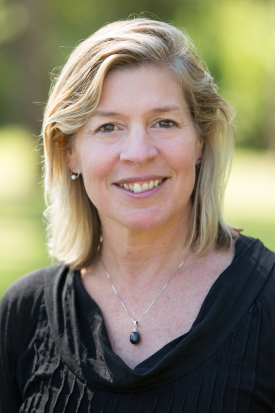
Blair Palese is managing editor of Climate and Capital Media and co founder of 350.org Australia. (Photo: Courtesy of Blair Palese)
PALESE: That's right, that's right. We don't yet know what the death toll was from that heat wave in India and Pakistan. But it will be extreme, and it will be a wake up call to every country in the world, that this is coming to every country, the changes will be dramatic, they will start to interact with each other. We will see impacts on water, we will see impacts on air quality, like we did here in the fires in Australia. So I think it's all before us. I think the opportunities are there. I hope Australia can add some new blood and excitement to that. And I hope we can move it without being held back by the situations that we're seeing; people, for instance, returning like Biden is to, let's go back to our own reserves. We need to push forward renewables. We can do it, we must do it and we have every reason to do it if we want a livable planet.
CURWOOD: Blair Palese is the managing editor of Climate and Capital Media and co founder of 350.org Australia. Blair, thanks so much for taking the time with us today.
PALESE: Thank you, it was a great pleasure.
Links
Watch: Al Jazeera | “Australia’s New PM Albanese Backs Climate, Defying Murdoch Media”
Living on Earth wants to hear from you!
Living on Earth
62 Calef Highway, Suite 212
Lee, NH 03861
Telephone: 617-287-4121
E-mail: comments@loe.org
Newsletter [Click here]
Donate to Living on Earth!
Living on Earth is an independent media program and relies entirely on contributions from listeners and institutions supporting public service. Please donate now to preserve an independent environmental voice.
NewsletterLiving on Earth offers a weekly delivery of the show's rundown to your mailbox. Sign up for our newsletter today!
 Sailors For The Sea: Be the change you want to sea.
Sailors For The Sea: Be the change you want to sea.
 The Grantham Foundation for the Protection of the Environment: Committed to protecting and improving the health of the global environment.
The Grantham Foundation for the Protection of the Environment: Committed to protecting and improving the health of the global environment.
 Contribute to Living on Earth and receive, as our gift to you, an archival print of one of Mark Seth Lender's extraordinary wildlife photographs. Follow the link to see Mark's current collection of photographs.
Contribute to Living on Earth and receive, as our gift to you, an archival print of one of Mark Seth Lender's extraordinary wildlife photographs. Follow the link to see Mark's current collection of photographs.
 Buy a signed copy of Mark Seth Lender's book Smeagull the Seagull & support Living on Earth
Buy a signed copy of Mark Seth Lender's book Smeagull the Seagull & support Living on Earth

